The books listed below are for your benefit and are the books that I own/have owned. Some I recommened highly, others are not so much.
 = you have to have this book :-)
= you have to have this book :-)
DOS Books: Last updated: 15 May 2016
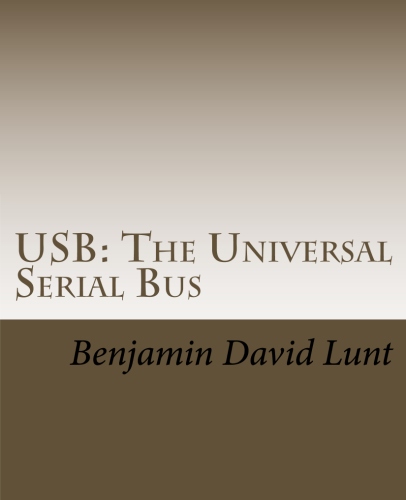

USB: The Universal Serial Bus, 3rd Ed




by Benjamin David Lunt (ISBN-13: 978-1717425362 ISBN:10 1-717425-36-4) (2018)
"Programming the USB hardware with the UHCI, OHCI, EHCI, and the new xHCI"
Found at Amazon and see for more information.
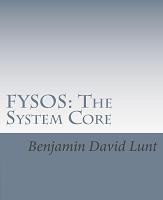

FYSOS: The System Core




by Benjamin David Lunt (ISBN-13: 978-1492958444 ISBN:10 1-492958-44-1) (2013)
"Building a minimal multi-threading Operating System with complete Assembly source code"
Found at Amazon and see for more information.
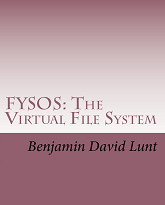

FYSOS: The Virtual File System




by Benjamin David Lunt (ISBN-13: 978-1499164893 ISBN:10 1-499164-89-0) (2014)
"The link between your kernel and the file system."
Found at Amazon and see for more information.
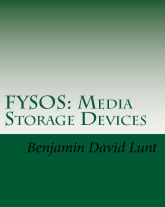

FYSOS: Media Storage Devices




by Benjamin David Lunt (ISBN-13: 978-1514111888 ISBN:10 1-514111-88-8) (2015)
"Programming the Media Storage Devices"
Found at Amazon and see for more information.
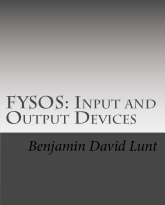

FYSOS: Input and Output Devices




by Benjamin David Lunt (ISBN-13: 978-1533053565 ISBN:10 1-533053-56-1) (2016)
"Programming Input and Output Devices"
Found at Amazon and see for more information.
 Advanced MS-DOS Programming (Microsoft Press)
Advanced MS-DOS Programming (Microsoft Press)
by Ray Duncan (ISBN 0-914845-77-2) (1988)
"The Microsoft guide for Assembly and C programmers"
Direct link to this book:
Amazon.
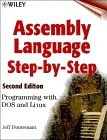 Assembly Language Step by Step 2nd ed. (John Wiley & Sons)
Assembly Language Step by Step 2nd ed. (John Wiley & Sons)
by Jeff Duntemann (ISBN 0471375233) (May 2000)
A book/CD-ROM guide for programmers. Begins with an overview of the internal operations of the Intel-based PC, then covers all steps involved in writing, testing, and debugging assembly programs. Presents working example programs for both the DOS and Linux operating systems using the popular free assembler NASM.
(Book News, Inc.)
Direct link to this book:
Amazon.
 Assembler Language Subroutines for MS-DOS 2nd ed. (Brady)
Assembler Language Subroutines for MS-DOS 2nd ed. (Brady)
by Leo J. Scanlon (ISBN 0-8306-7649-x) (1992)
Includes source and documentation for many DOS programming techniques in Assembler.
Direct link to this book:
Amazon.
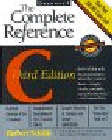 C: The Complete Reference Third Edition (Osborne)
C: The Complete Reference Third Edition (Osborne)
by Herbert Schildt (ISBN 0-07-882101-0) (1995)
Includes source and documentation for many DOS programming techniques in C, and includes C source and documentation on building a C interpreter.
Most people I have talked with say that Herbert Schildt can not write a good book, however I think this book is actually very helpful.
Direct link to this book:
Amazon.
 Compilers: Principles, Techniques, and Tools (Addison Wesley Longman, Inc.)
Compilers: Principles, Techniques, and Tools (Addison Wesley Longman, Inc.)
by Alfred V Aho, Ravi Sethi, Jeffery D. Ullman (ISBN 0-20110-088-6) (1985)
Also known as the Dragon Book.
Direct link to this book:
Amazon
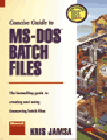 Concise Guide to MS-DOS Batch Files (Microsoft Press)
Concise Guide to MS-DOS Batch Files (Microsoft Press)
by Kris Jamsa (ISBN 1-55615-638-3) (1994)
Includes script and documentation on most DOS Batch file techniques and uses.
Direct link to this book:
Amazon.
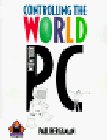

Controlling the World With Your PC (Technology Publishing)
by Paul Bergsman (ISBN 1-878707-15-9) (1994)
Includes schematics and source code for many small hardware projects using the parallel port. Some include, colored LED's, stepper motors, sensors, etc.
Direct link to this book:
Amazon.
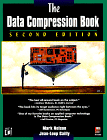

The Data Compression Book 2nd ed. (M&T Books)
by Mark Nelson (ISBN 1-55851-434-1) (1996)
Data compression from Addition to Huffman to Ziv/Lempel. Includes Source code
Direct link to this book:
Amazon.


Dissecting DOS (Addison/Wesley)
by Michael Podanoffsky (ISBN 0-201-62687-x) (1995)
This book describes the insides of DOS. The author even creates a 'Work-Alike' DOS operation system called RxDOS with source code for rxdosio.com (MS IO.SYS), rxdos.com (MS DOS.SYS), and rxdoscmd.com (MS COMMAND.COM). If you are creating your own DOS like Operating System, you gotta have this book.
Direct link to this book:
Amazon.


DOS 5: A Developers Guide. Advance Programming Guide to DOS
by Al Williams (ISBN 1-558-51177-6) (Jan 1995)
I have not reviewed this book yet. However I plan to soon. You can get it directly from the author at:
http://www.al-williams.com/opbook.htm for $42.00 (US). He said that he has a small inventory of new books left.
Direct link to this book:
Amazon.
 DOS Internals (Addison Wesley)
DOS Internals (Addison Wesley)
by Geoff Chappell (ISBN 0-201-60835-9) (1994)
Part of the "Andrew Schulman Programming Series". Details on how DOS loads, executes, memory usage, etc., with errors and documentation on what is wrong with some of the main kernel features of DOS.
Direct link to this book:
Amazon.
 DOS Power User's Guide (Osborne/McGraw-Hill)
DOS Power User's Guide (Osborne/McGraw-Hill)
by Kris Jamsa (ISBN 0-07-881310-7) (1988)
"The Best Single Source of Unique DOS Features and Expert Techniques For Sophisticated Users", (front cover)
Direct link to this book:
Amazon.
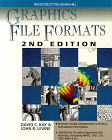 Graphics File Formats 2nd ed. (Windcrest/McGraw-Hill)
Graphics File Formats 2nd ed. (Windcrest/McGraw-Hill)
by David C Kay, John R. Levine (ISBN 0-07-034025-0) (1995)
Image compression and formats for MPEG, JPEG, GIF, TIFF, BMP, FLI, and many more.
Direct link to this book:
Amazon.
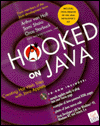

Hooked on JAVA (Addison/Wesley)
(ISBN 0-201-48837-x) (1996)
Hooked on JAVA. If you are going to have JAVA applets on your page, this book will tell you how to do it with little effort on your part.
The copy I have came with a free JAVA compiler. (look for the round yellow sticker on the cover)
Direct link to this book:
Amazon.
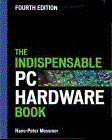 The Indispensable PC Hardware Book (4th ed.) by Hans-Peter Messmer (ISBN 0-201-59616-4) (2002)
The Indispensable PC Hardware Book (4th ed.) by Hans-Peter Messmer (ISBN 0-201-59616-4) (2002)
- CPU's from the 8086/8088 to the Pentium III and Athlon
- Real, protected and c86 modes
- PnP devices
- Timers, Interrupts, DMA, I/O, PCI bus, AGP, USB, etc.
A nice addition to your hardware documentation.
Direct link to this book:
Amazon.
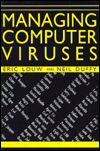 Managing Computer Viruses (Oxford)
Managing Computer Viruses (Oxford)
by Eric Louw and Neil Duffy (ISBN 0-19-853974-6) (1992)
Explains the diffrence between most common types of viruses, Trojans, Worms, etc., and give some history on specific viruses found all over the world.
Direct link to this book:
Amazon.
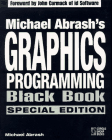 Michael Abrash's Graphics Programming Black Book Special ed. (Coriols Group)
Michael Abrash's Graphics Programming Black Book Special ed. (Coriols Group)

by Michael Abrash (ISBN 1-57610-174-6) (1997)
Complete with every graphics book, documentation, letter, note Michael Abrash ever wrote.
Direct link to this book:
Amazon.
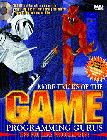

More Tricks of the Game Programming Gurus (Sams Publishing)


(ISBN 0-672-30697-2) (1995)
This is the "sequel" to Tricks of the Game Programming Gurus below.
Need I say more?
Direct link to this book:
Amazon.
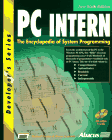

PCINTERN 6th ed. (Abacus)

by Micheal Tischer (ISBN 1-55755-304-1) (1996)
I have edition 5 which has 730+ pages of detailed documentation on systems programming including source in Quick Basic, C, Pascal, and Assembly. A great companion to PC Programmers Bible above.
Direct link to this book:
Amazon.


PC Magazine Basic Techniques and Utilities (PC Magazine)
by Ethan Winer (ISBN 1-56276-008-4) (1991)
Go to http://www.ethanwinner.com for the complete book on disk.
Direct link to this book:
Amazon.
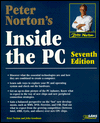 Peter Norton's Inside the PC 7th ed. (SAMS Publishing)
Peter Norton's Inside the PC 7th ed. (SAMS Publishing)

by Peter Norton (ISBN 0-672-31041-4)(1997)
This book explains the workings of the PC. From Asynchronous Transmission Modems to Video Processing. If you wanted to know how the hardware of your PC was set up and how it worked, this book explains it all. There are even small programs to test your learnings.
Direct link to this book:
Amazon.
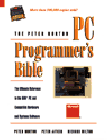 Peter Norton's PC Programmer's Bible 3rd ed. (Microsoft Press)
Peter Norton's PC Programmer's Bible 3rd ed. (Microsoft Press)




by Peter Norton, Peter Aitken, and Richard Wilton (ISBN 1-55615-555-7) (1993)
This is a must have book for any DOS programmers library. This book has information on most documented DOS and BIOS interrupt services as well as memory assignments. This book also discusses how the PC works, DOS workings, as well as program development. If you only get one book in your library, make it this one.
Direct link to this book:
Amazon.
 Programmers Guide to the PC 2nd ed. (Microsoft Press)
Programmers Guide to the PC 2nd ed. (Microsoft Press)
by Peter Norton (ISBN 0-914845-46-2) (1985)
"The ultimate reference guide to the entire family of IBM personal computers", cover
Direct link to this book:
Amazon.
 Programmers Problem Solver 2nd ed. (Brady)
Programmers Problem Solver 2nd ed. (Brady)
by Robert Jourdain, and the Peter Norton Computing Group (ISBN 0-13-720194-x) (1992)
Includes source and documentation for many DOS programming techniques in Assembler, C, Basic, and Pascal.
Direct link to this book:
Amazon.
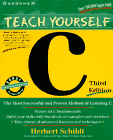 Teach Yourself C 3th ed. (Osborn/McGraw-Hill)
Teach Yourself C 3th ed. (Osborn/McGraw-Hill)
by Herbert Schildt (ISBN 0078823110) (1997)
I have an earlier edition of this book and it is great if you are learning C. The author explains how to program C for beginners. This book is a good reference for advanced C users also. Heck, I still grab it a few times.
Direct link to this book:
Amazon.
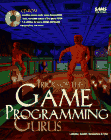

Tricks of the Game Programming Gurus (Sams Publishing)



by LaMothe, Ratcliff, Seminatore & Tyler (ISBN 0-672-30507-0) (1994)
The great book shows you how to write games comparable to Doom and Wolf-3D. It even contains a smaller game with all source that you can learn to write and then add to it. This book shows how to write everything you need for your game. Sound, Music, Serial communications, Artificial Intelligence, Raytracing, etc. This is a must have book for multimedia programming. See above for the "sequel" to this book
Direct link to this book:
Amazon.
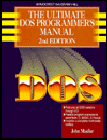 The Ultimate DOS Programmers Manual 2nd ed. (Windcrest/McGraw-Hill)
The Ultimate DOS Programmers Manual 2nd ed. (Windcrest/McGraw-Hill)
by John Mueller (ISBN 0-8306-4114-9) (hc) (1994)
Includes source and documentation for many DOS programming techniques in Assembler, C, Basic, and Pascal.
Direct link to this book:
Amazon.


Undocumented DOS (Addison Wesley)



by Andrew Schulman (ISBN 0-201-57064-5) (1990) (ISBN 0-201-63287-X) (1993)
Need I say more? Includes the List of Lists, undocumented DOS services, etc.
Get the Errata, Commentary, and Release Notes for:
1st ed,
2nd ed
Direct link to this book:
Amazon (1st)/Amazon (2nd).
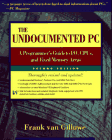 The Undocumented PC (Addison Wesley)
The Undocumented PC (Addison Wesley)



by Frank Van Gilluwe (ISBN 0-201-47950-8) (1996)
"The ultimate source for low-level details on the PC" -- Mike Schmit, author of Pentium Processor Optimization Tools.
"... a category-killer for PC-hardware junkies...hard-core technical information." -- Circuit Cellar INK.
Includes undocumented instructions, fixed memory values, as well as other undocumented items about the PC. Also includes items such as detecting hardware, port descriptions, different processors, keyboards, etc.
Direct link to this book:
Amazon.
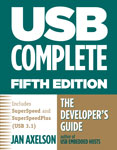

USB Complete (Lakeview Research)

USB Complete Fifth Edition (Lakeview Research) a must have book
by Jan Axelson (978-1931448284) (2017)
Covers device controllers, enumeration, USB classes, with example .NET
applications. Includes USB 3.0 and SuperSpeed.
Direct link to this book:
Amazon, and Jan's Website.
* The only reason I don't give this one any more stars is that it doesn't deal with DOS, though it still is a must have for USB and Windows *
 Write Great Code Vol. II
Write Great Code Vol. II
No Starch Press by Randy Hyde (ISBN 1-59327-003-8) (2006)
I had the great priviledge of being the Technical Reviewer for this volume.
I have been programming and writing source code for many years now, and thought
that I was writing great code. However, there are some items in this book that I
did not know and found quite interesting. Even if you think you know how to write
great code, you still need to read this book.
Direct link to this book:
Amazon.


Zen of Graphics Programming 2rd ed. (The Coriolis Group)
by Michael Abrash (ISBN 1-883577-89-6) (1996)
If you want to do graphics, you need this book. The author is highly known for his knowledge of graphics programming. Included in the book is MODE-X programming.
Direct link to this book:
Amazon.
 = you have to have this book :-)
= you have to have this book :-)





























 Advanced MS-DOS Programming (Microsoft Press)
Advanced MS-DOS Programming (Microsoft Press) Assembly Language Step by Step 2nd ed. (John Wiley & Sons)
Assembly Language Step by Step 2nd ed. (John Wiley & Sons) Assembler Language Subroutines for MS-DOS 2nd ed. (Brady)
Assembler Language Subroutines for MS-DOS 2nd ed. (Brady) C: The Complete Reference Third Edition (Osborne)
C: The Complete Reference Third Edition (Osborne) Compilers: Principles, Techniques, and Tools (Addison Wesley Longman, Inc.)
Compilers: Principles, Techniques, and Tools (Addison Wesley Longman, Inc.) Concise Guide to MS-DOS Batch Files (Microsoft Press)
Concise Guide to MS-DOS Batch Files (Microsoft Press)







 DOS Internals (Addison Wesley)
DOS Internals (Addison Wesley) DOS Power User's Guide (Osborne/McGraw-Hill)
DOS Power User's Guide (Osborne/McGraw-Hill) Graphics File Formats 2nd ed. (Windcrest/McGraw-Hill)
Graphics File Formats 2nd ed. (Windcrest/McGraw-Hill)

 The Indispensable PC Hardware Book (4th ed.) by Hans-Peter Messmer (ISBN 0-201-59616-4) (2002)
The Indispensable PC Hardware Book (4th ed.) by Hans-Peter Messmer (ISBN 0-201-59616-4) (2002) Managing Computer Viruses (Oxford)
Managing Computer Viruses (Oxford) Michael Abrash's Graphics Programming Black Book Special ed. (Coriols Group)
Michael Abrash's Graphics Programming Black Book Special ed. (Coriols Group)










 Peter Norton's Inside the PC 7th ed. (SAMS Publishing)
Peter Norton's Inside the PC 7th ed. (SAMS Publishing)

 Peter Norton's PC Programmer's Bible 3rd ed. (Microsoft Press)
Peter Norton's PC Programmer's Bible 3rd ed. (Microsoft Press)




 Programmers Guide to the PC 2nd ed. (Microsoft Press)
Programmers Guide to the PC 2nd ed. (Microsoft Press) Programmers Problem Solver 2nd ed. (Brady)
Programmers Problem Solver 2nd ed. (Brady) Teach Yourself C 3th ed. (Osborn/McGraw-Hill)
Teach Yourself C 3th ed. (Osborn/McGraw-Hill)




 The Ultimate DOS Programmers Manual 2nd ed. (Windcrest/McGraw-Hill)
The Ultimate DOS Programmers Manual 2nd ed. (Windcrest/McGraw-Hill)




 The Undocumented PC (Addison Wesley)
The Undocumented PC (Addison Wesley)






 Write Great Code Vol. II
Write Great Code Vol. II
